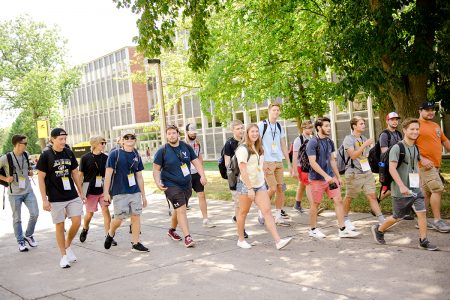Ryan Williams (GLRC) is the PI on a project that has received a $398,843 research and development grant from the U.S. Army Construction Engineering Research Laboratory.
The project is titled “Robotic Platform Soil and Terrain Characterization for Close to Real Time GO/NOGO Maps.”
Thomas Oommen (GMES/GLRC/ICC-DataS) and Jeremy Bos (ECE/GLRC/ICC-DataS) are co-PIs on this potential two-year project.

Their first classes and undergraduate research experiences have barely begun, but at more than 1,480 strong, Michigan Tech’s Class of 2025 is one for the record books.
Michigan Technological University’s newest Huskies arrived on campus last week, and they are the largest incoming class the University has seen since 1982, accounting for a 23% increase in first-year student enrollment from fall 2020. Incoming academic credentials remain the highest in University history.
“We couldn’t be more excited to welcome such an incredible class of talented students to the Michigan Tech family,” said Michigan Tech President Rick Koubek. “We are a distinct research institution, offering opportunities and experiences unique to Michigan Tech. Students recognize that. That’s why they want to be here.”
MTU’s incoming class also has the highest number of first-year students from ethnically diverse communities, with 162 identifying as members of underrepresented racial and ethnic groups. And, the University has 2,054 students who identify as women enrolled — its highest number ever, accounting for 29% of the total student population.
“Tech’s record-breaking enrollment this year is proof positive that Michigan Tech is one of the top universities in the world, and we are indeed a destination institution for talented women, minority, international and other students,” said Vice President for Student Affairs and Dean of Students Wallace Southerland III.
Tech’s total enrollment currently stands at 6,977, an increase from 6,875 in 2020-21, a year in which the global pandemic overshadowed the myriad of factors that consistently affect college choice. Full-time student enrollment has increased 3%.
“Students are choosing Michigan Tech not only for academics and the famed Husky experience, but also because the University proved time and again throughout the previous academic year that we’re committed to providing in-person learning while keeping the health and safety of our community paramount,” said Assistant Vice President for Enrollment Management Kyle Rubin.
MTU Flex, Tech’s comprehensive plan to ensure continuity of learning, teaching, research and workflows while prioritizing the health and safety of the campus community, includes proactive measures unique to the University’s deep research resources and exceptional faculty, such as wastewater monitoring to detect possible outbreaks in residence halls and the state’s only COVID-19 testing lab situated at a university without a medical school.